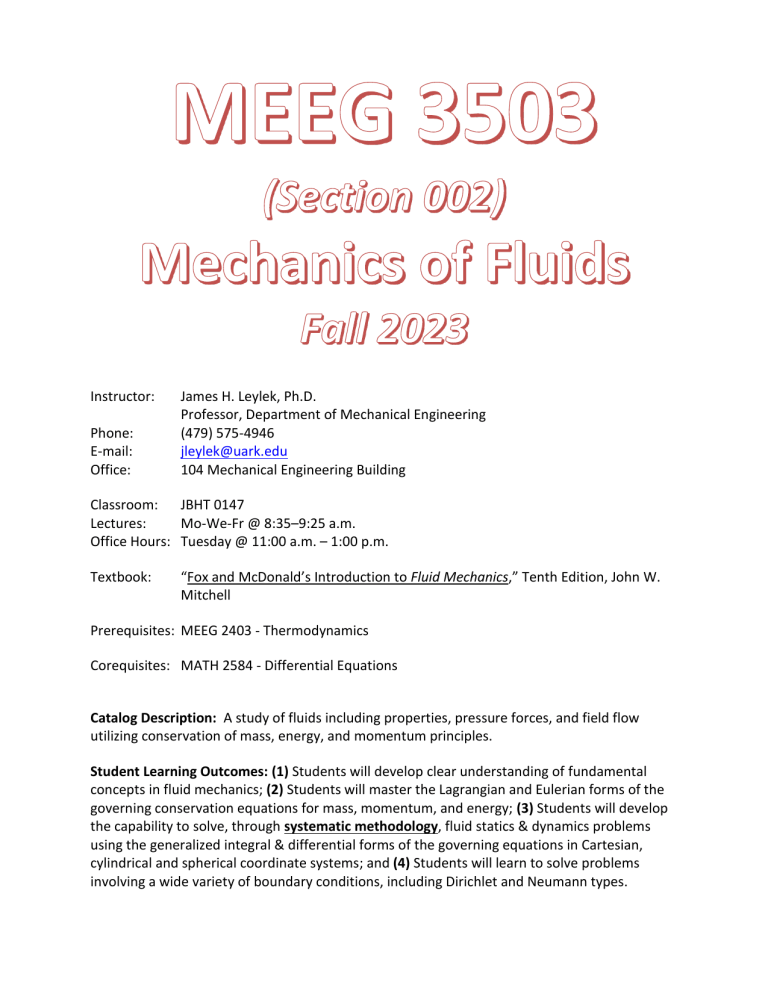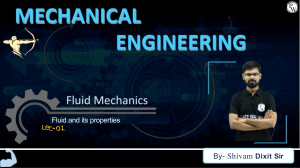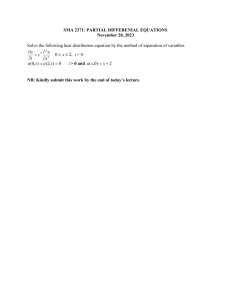
Instructor: Phone: E-mail: Office: James H. Leylek, Ph.D. Professor, Department of Mechanical Engineering (479) 575-4946 jleylek@uark.edu 104 Mechanical Engineering Building Classroom: JBHT 0147 Lectures: Mo-We-Fr @ 8:35–9:25 a.m. Office Hours: Tuesday @ 11:00 a.m. – 1:00 p.m. Textbook: “Fox and McDonald’s Introduction to Fluid Mechanics,” Tenth Edition, John W. Mitchell Prerequisites: MEEG 2403 - Thermodynamics Corequisites: MATH 2584 - Differential Equations Catalog Description: A study of fluids including properties, pressure forces, and field flow utilizing conservation of mass, energy, and momentum principles. Student Learning Outcomes: (1) Students will develop clear understanding of fundamental concepts in fluid mechanics; (2) Students will master the Lagrangian and Eulerian forms of the governing conservation equations for mass, momentum, and energy; (3) Students will develop the capability to solve, through systematic methodology, fluid statics & dynamics problems using the generalized integral & differential forms of the governing equations in Cartesian, cylindrical and spherical coordinate systems; and (4) Students will learn to solve problems involving a wide variety of boundary conditions, including Dirichlet and Neumann types. Topical Outline: 1. Introduction, Overview & Fundamental Concepts 2. Fluid Statics a. Pressure Variation b. Manometers c. Forces on Submerged Plane & Curved Surfaces 3. Basic Laws – Conservation of Mass, Momentum & Energy a. Lagrangian and Eulerian Approaches b. Reynolds Transport Theorem c. Systematic Methodology d. Integral Form of Conservation Equations for a Control Volume 4. Conservation Equations in Differential Form a. Continuity Equation b. Navier-Stokes Equations c. Energy Equation 5. Unified Form of Conservation Equations 6. Computational Fluid Dynamics (CFD) 7. Incompressible, Inviscid Flow a. Streamlines, Pathlines, Streaklines b. Flow Properties Along & Normal to Curved Streamlines 8. Dimensional Analysis, Modeling and Similitude 9. Internal, Incompressible, Viscous Flow a. Exact Solutions to Navier-Stokes Equations b. Laminar and Turbulent Flows 10. External, Incompressible, Viscous Flow a. Boundary Layer Theory b. Laminar and Turbulent Boundary Layers 11. Compressible Flow a. Isentropic Flow b. Converging-Only Thrust Nozzles c. Converging-Diverging Thrust Nozzles d. Effect of area change, friction, and heat transfer 12. Fluid Machinery Homework: Specific homework problems at the end of each chapter will always be in reference to the official textbook in this course. Students using older editions or international versions of this textbook (or other textbooks) must assume the responsibility to get the correct set of homework problems from their classmates. Solutions to all the assigned homework problems will be posted on Blackboard soon after the deadline. Given the nature of fluid mechanics, which involves a couple of rather significant step changes in the level of difficulty of topics toward the middle (integral analysis) and later in the semester (differential analysis), it is highly recommended for students NOT to fall behind!!! Importance of solving all the homework problems cannot be over emphasized. Homework problems are deliberately picked to help students master the fundamentals, acquire the skills needed to recognize how best to solve problems, solve them quickly, and, just as importantly, develop that all important “feel” for the physics of fluid flow. Students who do not bother to really solve homework problems, or just copy readily available solutions, have never done well in this course (based on this instructor’s well over two decades of experience teaching undergraduate fluid mechanics). Please note that homework problems will not be collected/graded – obviously, self-discipline is critically important here!!! Exams: Three mid-term exams will be administered in-class. These will be written tests, each with 50-minute duration. In addition, there will be a dedicated, two-hour, in-class comprehensive final exam at the end of the semester. All three mid-terms and the final exam are open textbook only type tests (no lecture notes, slides, homework solutions, other textbooks & references, etc., etc., etc….). The idea here is for students to focus on truly understanding all the concepts, but not waste any time memorizing anything. If in case the UofA administrators decide that we should pivot to remote teaching, it is only the “in class” nature of these tests will change to “on line” via Blackboard – all other aspects (open textbook only, exam duration, etc.) will remain the same. Mid-term Exam #1 – Friday, 15 September 2023 at 8:35-9:25 a.m. (50 mins) Mid-term Exam #2 – Friday, 13 October 2023 at 8:35-9:25 a.m. (50 mins) Mid-term Exam #3 – Friday, 10 November 2023 at 8:35-9:25 a.m. (50 mins) Trans-Curriculum Design Problem – Friday, 1 December 2023 at 8:35 a.m. Comprehensive Final Exam – Wednesday, 13 December 2023 at 8:00-10:00 a.m. (2 hrs) Grading: Exam #1 Exam #2 Exam #3 Final Exam Trans-Curr. Design 15% 15% 20% 40% 10% A 100-point grading scale will be used for all the exams. The letter grade in the course will be based on the absolute scale of the weighted-average grade with A (90-100), B (80-89), C (70-79), D (60-69), etc....... Attendance Policy: We will conduct everything (lecture, discussion, all exams, and Office Hours) in person. Unless the UofA administrators request us to teach in the “virtual mode” for another round of pandemic related or other reasons, it’ll prove to be super-helpful for students to strive for 100% attendance!!! As a matter of principle, I do not believe in “threat based” teaching, at all! Old-fashioned practices involving point deductions for missed lectures, not attending Office Hours, remaining disengaged, etc. will not take place in this course. I teach because I honestly love teaching – especially fluid mechanics! I hope you are here because you want to learn. There is nothing I can do to teach students who are determined not to learn – those students will win that argument every time. It is my responsibility to inform all students in this course, given the “systematic methodology” based solution techniques I teach, that I expect demonstration of effective use of such techniques in exam solutions (it’s only because this is exactly what’s expected in professional engineering practice!). Finding the right answer “somehow” will not work. Clearly, students who are fully engaged will do well. Students are strongly urged to attend, just as a matter of principle, every single lecture and take full advantage of weekly Office Hours. Also, it is critically important that students participate in “active style” of teaching and learning process. Students may leave the classroom if the professor (or a substitute) does not arrive within 15 minutes after the start of a lecture. Disabilities: “It is the University policy to provide, on a flexible and individualized basis, reasonable accommodations to students who have disabilities. Students are encouraged to contact Student Disability Services to discuss their individual needs for accommodations. If you have a documented disability that requires accommodation, you must notify the professor in writing during the first week of classes.” I will cheerfully accommodate students in need of extra exam time, so long as I receive proper CEA documentation. Academic Integrity at the University of Arkansas: As members of the University of Arkansas community we share a fundamental vision for a mutual commitment to truthfulness, honor, and responsibility, without which we cannot earn the trust and respect of others. Furthermore, we recognize that academic dishonesty detracts from the value of a University of Arkansas degree. Therefore, we shall not tolerate lying, cheating, or stealing in any form. Effective Fall 2011, Academic Integrity Policy (http://provost.uark.edu/245.php) and Academic Integrity Sanction Rubric (http://provost.uark.edu/246.php) are in effect. Please be sure to familiarize yourself with these policies.


